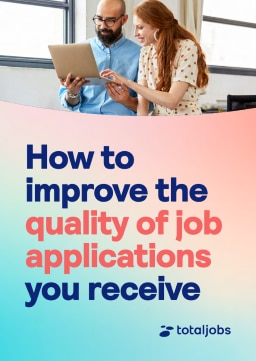
7 ways AI is changing the hiring process in 2025 (and how to stay human)
Table of Contents
- 1. Faster candidate screening
- 2. Smarter skills-based assessments
- 3. Personalised job recommendations
- 4. AI-enhanced application assistance
- 5. Reducing admin workload
- 6. AI tips for smaller companies
- 7. Predictive analytics
- How to balance AI with human insight
- Smarter, not just fater hiring
- FAQs

How to Improve Job Application Quality
In 2025, AI tools are integrated across the recruitment journey, making hiring faster, more data-driven, and often more efficient. On average, recruiters estimate that 41% of applications have been enhanced by AI tools, from CV optimisation to automated assessments.
But while these innovations bring clear advantages, they also introduce new risks, especially around authenticity, fairness, and over-reliance on technology.
1. Faster candidate screening
Sifting through hundreds of CVs can be one of the most time-consuming parts of recruitment. AI-powered applicant tracking systems (ATS) are now helping hiring teams to speed up this stage dramatically.
But faster doesn’t always mean fairer and it’s important to balance efficiency with thoughtful evaluation.
What’s changing?
AI-powered applicant tracking systems (ATS) can now scan and filter hundreds of CVs in seconds, identifying candidates based on key skills and experience.
Benefits:
- Speeds up the shortlisting process, saving recruiters hours of manual work.
- Gives your organisation a head start in approaching top talent.
Risks to watch:
- Over-reliance on keyword matching could overlook great candidates with unconventional backgrounds or creative CVs.
- Consider supplementing AI screening with human review to avoid missing hidden gems.
2. Smarter skills-based assessments
Too often, great candidates are ruled out because their CV doesn’t match traditional expectations. AI-based skills assessments are shifting the focus towards what people can actually do, helping recruiters assess ability, not just background.
But these tools need to be designed and applied carefully to ensure they truly support inclusive hiring.
What’s changing?
AI-driven platforms offer pre-screening tests that evaluate technical skills, problem-solving abilities, and even soft skills before interviews begin.
Benefits:
- Creates a fairer, evidence-based assessment of candidates.
- Reduces bias from focusing solely on education or previous job titles.
Risks to watch:
- Poorly designed tests may disadvantage neurodiverse candidates or those from different cultural backgrounds.
- Always test your assessments for fairness and accessibility.
3. Personalised job recommendations
The best hiring outcomes happen when the right people find the right opportunities.
AI is now helping jobseekers by recommending roles that fit their skills and preferences. This improves the quality of applications — but only if those recommendations are genuinely diverse and not limited by narrow algorithms.
What’s changing?
AI tools suggest tailored job matches to candidates based on their skills, experience, and preferences.
Benefits:
- Increases the relevance and quality of applications.
- Helps candidates discover roles they might otherwise have missed.
Risks to watch:
- Algorithms can reinforce existing bias by recommending only “safe” or traditional career paths.
- Review AI suggestions regularly to ensure they promote diversity and opportunity.
4. AI-enhanced application assistance
It’s not just recruiters using AI, candidates are embracing it too. Many are using AI tools to improve their applications, from tailoring CVs to crafting cover letters.
This can make applications clearer and easier to assess, but it also raises questions about authenticity and genuine motivation.
What’s changing?
Candidates are increasingly using AI tools to improve their CVs and cover letters:
- 67% of jobseekers use AI to tailor CVs to job descriptions.
- 65% use AI to refine or generate cover letters.
Benefits:
- Leads to clearer, more structured applications for recruiters to review.
Risks to watch:
- 74% of recruiters feel AI makes applications feel less authentic, making it harder to assess genuine interest and cultural fit.
- Focus interviews on real experiences and behaviours to cut through generic AI-polished applications.
5. Reducing admin workload with automation
Recruitment involves a lot of admin, including scheduling interviews, answering FAQs, and sending follow-ups. AI-powered tools can handle many of these routine tasks, freeing recruiters to focus on relationship-building and decision-making.
The challenge? Making sure the process still feels personal and candidate-friendly.
What’s changing?
Chatbots and AI-driven scheduling tools manage routine tasks like booking interviews and responding to candidate queries.
Benefits:
- Saves time on admin, freeing up recruiters for more strategic work like candidate engagement and interview coaching.
Risks to watch:
- Over-automation can feel impersonal.
- Ensure candidates always have access to a real person for key questions or concerns.
6. Practical AI tips for smaller companies
You don’t need to be a big global corporation to benefit from AI in recruitment. Even small businesses can use simple, affordable tools to streamline their hiring process.
The key is to focus on the areas where automation makes the biggest impact without losing the personal touch that smaller organisations often do best. Smaller employers might not have big budgets for full-scale AI recruitment platforms but there are still effective ways to harness AI while staying people-focused.
Try these:
- Use free or low-cost AI tools like Grammarly or ChatGPT to help screen CVs or draft job descriptions.
- Automate interview scheduling using tools like Calendly or Microsoft Bookings.
- Keep assessments simple: a basic online questionnaire or short skills test can still add structure and fairness.
- Focus on one or two stages where AI will save you the most time (such as first-stage CV filtering), rather than overhauling your entire process.
7. Predictive analytics: Handle with care
AI can help predict which candidates are likely to succeed, using data from previous hires. While this can improve decision-making, it also risks repeating the biases of the past if not handled responsibly.
Good data can support better hiring, but only if you ask the right questions and challenge the assumptions behind it.
What’s changing?
Some AI tools can now analyse historical hiring data to predict which candidates are likely to succeed based on past hires.
Benefits:
- Data-driven insights can reduce guesswork and improve hiring decisions.
Risks to watch:
- Predictive models may simply replicate the biases of past hiring decisions if not carefully audited.
- Always challenge the data: does it reflect your organisation’s values today or yesterday’s preferences?
How to balance AI with human insight
AI should be seen as an assistant and not the decision-maker. Here’s how to use it well:

- Keep human oversight at the core of your hiring process.
- Regularly audit AI tools for fairness, accuracy, and unintended bias.
- Train hiring teams on how to interpret AI-generated insights thoughtfully.
- Prioritise candidate experience, maintain personalised, respectful communication at every stage.
Smarter hiring, not just faster hiring
AI is here to stay and when used thoughtfully, it can help you hire smarter, faster, and fairer. But it’s human judgment, empathy, and experience that will always make the difference between a good hire and a great one.
Organisations that get this balance right will not only move quickly in a competitive talent market, they’ll build stronger, more inclusive teams ready for the future.
Frequently asked questions (FAQs)
How is AI changing recruitment in the UK?
AI is transforming recruitment in the UK by automating CV screening, improving candidate assessments, and offering data-driven insights. These advancements help businesses make their hiring process faster, fairer, and more efficient.
What are the risks of using AI in UK recruitment?
The primary risks include relying too much on automation, receiving less authentic applications, and encountering bias within algorithms. UK employers should audit AI tools regularly and maintain human input throughout the process to address these concerns.
Can small businesses in the UK use AI for hiring?
Yes, small and medium-sized enterprises in the UK can successfully use affordable AI tools such as Grammarly, ChatGPT, or automated interview scheduling platforms like Calendly to simplify their recruitment process while keeping the personal element intact.
How can UK companies ensure fairness when using AI in recruitment?
UK companies can ensure fairness by combining AI with human judgement, reviewing AI systems regularly for any bias, and making sure that assessments remain accessible and inclusive for all candidates including neurodiverse individuals.
Are AI-powered CV screening tools effective for UK hiring teams?
AI-powered CV screening tools can significantly reduce the time needed for shortlisting candidates. However, they are most effective when used alongside human evaluation to maintain a well-rounded selection process.
How does AI improve candidate experience in the UK recruitment process?
AI enhances candidate experience by providing quicker responses, offering personalised job recommendations, and simplifying interview scheduling. UK employers should still ensure that candidates can engage with a real person at important stages of the process.
Explore articles
Receive the latest recruitment resources and
advice to boost your hiring
By providing us with your details you agree to our privacy policy and for us to keep you updated with the latest news, events,
and special offers from Totaljobs.







